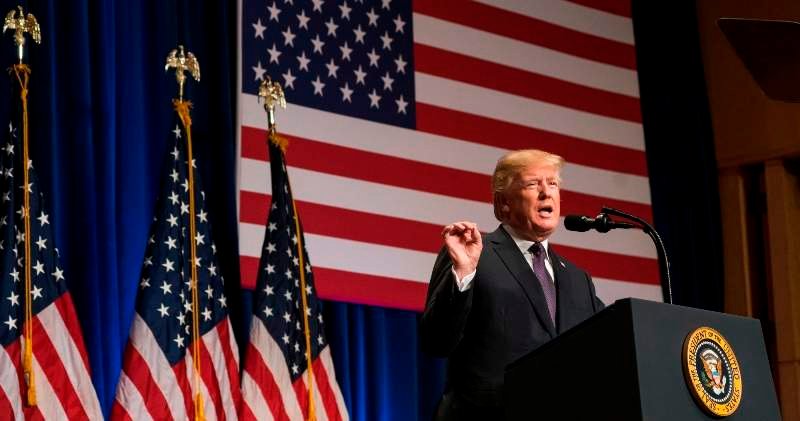Gold Silver Reports (GSR) – U.S.-China Trade Truce May Be Fleeting Absent Serious Reform — President Donald Trump had threatened to slap tariffs on up to $150 billion in Chinese imports, while Beijing vowed to respond in kind. For now, Mnuchin’s cease-fire declaration will soothe the nerves of investors worried that the world’s two biggest economies were on the verge of an all-out trade conflict.
The newly-declared economic truce between the U.S. and China will prove temporary if the world’s two largest economies fail to deliver on vague commitments to rebalance trade. “We’re putting the trade war on hold,” Treasury Secretary Steven Mnuchin said Sunday. “Right now, we have agreed to put the tariffs on hold while we execute the framework.”
The U.S. and China released a joint statement on Saturday, after two days of meetings in Washington between Chinese Vice Premier Liu He and senior American officials, including Trump.
The statement was “little more than a brief de-escalation of tensions,” said Eswar Prasad, a trade policy professor at Cornell University and former head of the IMF’s China unit.
Issues Unresolved
Two rounds of negotiations in Beijing and Washington “have resulted in at best a temporary standing down by both sides, while the fundamental differences on trade and other economic issues remain unresolved,” Prasad said.
China and the U.S. agreed to “substantially” reduce the U.S. trade deficit in goods with China, which reached $376 billion last year. Beijing promised to “significantly” increase purchases of U.S. goods and services. But there was no dollar figure attached, despite assurances by the White House that Beijing would cave to its demand for a $200-billion annual reduction in the goods shortfall.
Trump has an important strategic reason for removing the tariff threat against China: he needs Beijing’s cooperation as he prepares for an historic summit with North Korean leader Kim Jong Un in Singapore on June 12. It’s hard to imagine a peace deal with North Korea without the involvement of China, Kim’s most important political and economic ally.
China Rhetoric
Yet if trade talks with China fizzle, the president may soon feel the pressure to clamp down again, especially with midterm congressional elections looming in November. In their efforts to save the party’s majorities in the House and Senate, Republicans will lean hard on Trump’s brand, which he built on promises to help the working class in states like Ohio and Pennsylvania, where Trump’s fiery rhetoric on China resonated with voters.
The president remains preoccupied with a singular measure — the U.S. trade deficit — that will be difficult to shrink in the short term. It’s unclear how Beijing will ramp up buying of U.S. products, even though the one-party state exerts greater control than most governments over the spending decisions of companies.
Even if China dramatically increases its buying of American goods, that wouldn’t address the U.S. appetite for imports from China. Republican tax cuts and spending increases are set to inject fiscal stimulus into the U.S. economy that will stoke demand for foreign-made products.
Stubborn Imbalance
Economists say it’ll be tough to reduce the trade imbalance between the two nations without deep reforms that change the way they save and invest. China has shown little inclination toward a sudden opening of its economy, which relies heavily on state intervention and exports for growth.
It’s “difficult to contemplate” how the two countries could cut their trade imbalance by $200 billion, said Victor Shih, a professor at the University of California in San Diego who studies China’s politics and finance.
“Even with a drastic reallocation of Chinese imports of energy, raw materials and airplanes in favor of the U.S., the bilateral trade deficit may reduce by $100 billion,” said Shih. “A $200 billion reduction would mean a drastic reduction in Chinese exports to the U.S. and a dramatic restructuring of the supply chain.”
Export Curbs
It doesn’t appear the White House convinced China to accept export quotas, as Japan did in the 1980s when President Ronald Reagan carried out a strategy of “managed trade.” The U.S. has forced allies such as South Korea to accept steel quotas, and it’s putting pressure on others, including the European Union, to do the same for their metals sales. Avoiding similar constraints would be a victory for Chinese President Xi Jinping.
The U.S. has also made little progress forcing China to respect American intellectual property — the issue that caused the U.S. to threaten tariffs in the first place. In March, Trump’s officials concluded that Beijing flouts U.S. IP rules in a variety of ways, including by forcing American firms to transfer technology.
“As this process continues, the United States may use all of its legal tools to protect our technology through tariffs, investment restrictions and export regulations,” U.S. Trade Representative Robert Lighthizer said in a statement Sunday. “Real structural change is necessary. Nothing less than the future of tens of millions of American jobs is at stake.”
During hearings in Washington last week on the proposed tariffs, U.S. companies warned against the risks of imposing duties on Chinese imports. But many agreed the U.S. should take bolder steps to stop China from violating IP rights.
Patent Law
This weekend’s joint statement said only that both sides “attach paramount importance to intellectual-property protections,” and agreed to cooperate more. China will change its laws and regulations in this area, including its patent law, according to the statement.
Many U.S. businesses will be relieved the president isn’t following through on his tariff threat. But they’re still hoping for more tangible results in protecting their technology.
“It is a complicated endeavor to try to minimize the fallout of the Chinese political system. They have a state-run capitalist system in some respects. There are certainly market distortions that result from that,” said Dean Garfield, chief executive of the Information Technology Industry Council, a lobbying group that represents companies including Amazon.com Inc., Apple Inc. and Facebook Inc. “It’s a high stakes game.” – Neal Bhai Reports (NBR)
